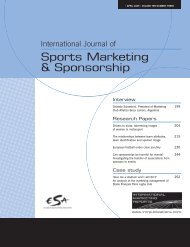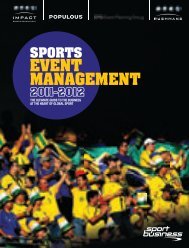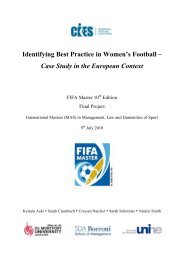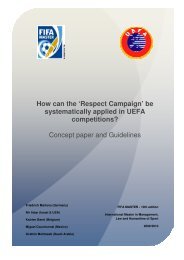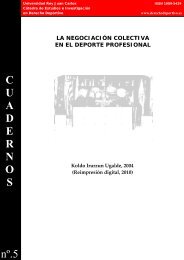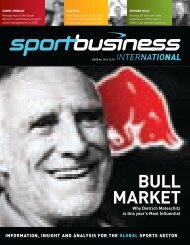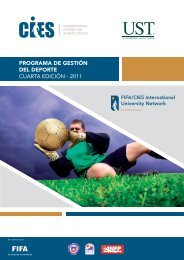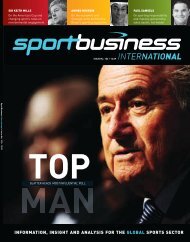4 - FIFA/CIES International University Network
4 - FIFA/CIES International University Network
4 - FIFA/CIES International University Network
You also want an ePaper? Increase the reach of your titles
YUMPU automatically turns print PDFs into web optimized ePapers that Google loves.
INSIGHT<br />
MATT CUTLER<br />
Deputy Editor<br />
SportBusiness <strong>International</strong><br />
COURT-SIDE ACTION<br />
TEAM OWNERS in the United<br />
States and beyond were due to<br />
discover in late August whether<br />
the competitiveness of their teams<br />
could be determined in a new arena<br />
- the divorce court.<br />
The prospect was raised by a bitter<br />
split between the owner of Major<br />
League Baseball’s LA Dodgers, Frank<br />
McCourt, and his ex-wife, Jamie,<br />
which prompted her to seek half the<br />
club as part of her settlement.<br />
Jamie McCourt married Frank in<br />
1979 and the couple has four grown<br />
sons. But she filed for divorce in<br />
2009 when acting as CEO of the<br />
team and drawing an annual salary<br />
of $2 million. The terms of an award<br />
were due to be thrashed out in a Los<br />
Angeles courtroom as SportBusiness<br />
<strong>International</strong> went to print.<br />
The acrimonious divorce has<br />
already been blamed for wrecking<br />
this season for the Dodgers, MLB’s<br />
fourth biggest franchise. McCourt<br />
installed his ex-wife as Dodgers CEO<br />
after buying the team from Rupert<br />
Murdoch’s News Corporation in<br />
2004. Their marriage imploded<br />
and she was sacked as the Dodgers<br />
exited the end-of-season play-offs in<br />
October 2009.<br />
The impact of the courtroom on<br />
the ballpark parallels two previous<br />
cases - the LA Lakers and San<br />
Diego Padres, both of which were<br />
ultimately sold to help settle divorce<br />
pay-offs - by paralysing team<br />
operations and limiting the amount<br />
of cash available to strengthen the<br />
playing roster. The $19 million<br />
spent by the McCourts on legal fees<br />
during their divorce are equal to<br />
the 2010 salary of the Dodgers’ star<br />
player, Manny Ramirez. Instead of<br />
high-profile young recruits, general<br />
manager Ned Colletti has been<br />
forced to recall a clutch of older<br />
players who had been sent out on<br />
loan to other teams.<br />
Lawyers claim circumstances<br />
in the case are not necessarily<br />
unique to the US but represent<br />
the latest example of a developing<br />
trend that could endanger sports<br />
teams worldwide.<br />
James Brown, associate with<br />
Manchester-based law firm<br />
Pannone, says one consequence<br />
of sports organisations being run<br />
along business lines is that stakes<br />
in sports clubs are no longer treated<br />
differently to any other asset to be<br />
divided on divorce. Pannone has<br />
handled many big-money divorces<br />
in the world of sport, including<br />
backers, boardroom members, star<br />
players and athletes.<br />
Judges have the power to divide<br />
a sports club as they would any<br />
other asset and, if a husband doesn’t<br />
have sufficient ready cash to settle<br />
a pay-out, can potentially order the<br />
sale of a club to raise the money.<br />
The implications for many clubs are<br />
acute, Brown argues, particularly<br />
for those reliant on support from<br />
banks: “No-one should be under<br />
any illusions that a football team is<br />
a ‘safe’ asset, immune to the reach<br />
The McCourts during the the 2009 Playoffs - Getty Images Sport<br />
English Premier League club owners will be among those reflecting on<br />
the outcome of a US divorce case with potentially significant ramifications.<br />
of a divorce court. It is very possible<br />
that the situation being played<br />
out in Los Angeles could be<br />
repeated elsewhere.<br />
“Many Premiership teams<br />
are heavily leveraged and the<br />
prospect of seeing ownership<br />
fought over can cause banks to pull<br />
funding in the same way that they<br />
can do with businesses in other<br />
sectors during marital battles.<br />
“That eventuality would, of<br />
course, have serious repercussions<br />
for the running of the club and<br />
even the on-field performance<br />
of the team by limiting the cash<br />
for wages, new players, stadium<br />
developments and so on.”<br />
Only last year, Veronica Lario<br />
was reported in the Italian media<br />
to be seeking a stake in AC Milan<br />
as part of her strategy in obtaining<br />
a generous pay-off from her<br />
ex-husband, Silvio Berlusconi.<br />
Brown adds the UK’s reputation<br />
for awarding settlements that are<br />
especially favourable to wives meant<br />
that even sport’s richest and most<br />
powerful figures are under pressure.<br />
In divorcing his wife, Slavica,<br />
Bernie Ecclestone was reported to<br />
have last year reached a generous<br />
settlement in order to retain his<br />
grip on world motorsport.<br />
Much of his $2 billion wealth had<br />
been built up during the couple’s<br />
24-year marriage and Slavica had<br />
been entrusted with looking after a<br />
family trust which controlled 10 per<br />
cent of the value of Formula One.<br />
Ryder Cup Director for The<br />
European Tour Richard Hills told<br />
me in May that golf’s biennial team<br />
event is the “transatlantic bridge<br />
in the world of sport.” He’s right<br />
– seldom do the sporting cultures<br />
of the USA and Europe cross other<br />
than at the Olympic Games.<br />
That said, the future growth and<br />
development of the Ryder Cup is<br />
unquestionably being driven from<br />
Europe. Bidding to host the event<br />
in eight years time is becoming the<br />
most competitive in golfing history,<br />
with several European nations<br />
willing to build bespoke courses<br />
and promising spectators a Ryder<br />
Cup that will raise their golfing<br />
experience to the next level.<br />
Interest in the USA has waned<br />
over the past 20 years, partly<br />
because of the strength of the<br />
European team (the USA’s record is<br />
two wins from the last seven played<br />
and Europe are strong favourites<br />
for Celtic Manor), but also from<br />
a significant proportion of the<br />
US golfing elite downplaying the<br />
event’s importance, believing the<br />
professional golf year is over once<br />
the PGA Championship is over.<br />
Add to that the Tiger Woods<br />
factor, a major draw for US<br />
television audiences. He didn’t play<br />
in 2008 through injury and despite<br />
still holding the number one<br />
ranking (albeit precariously), there<br />
are calls for him to not be part of<br />
the 2010 USA team given his poor<br />
form since his return from the<br />
extra-marital affair scandal.<br />
As you’ll see in our Ryder Cup<br />
feature starting on page 34, this<br />
year’s match is primed to have a<br />
positive economic impact of €100m<br />
to host country Wales, thanks in<br />
part to an influx of high-spending<br />
US sports fans, who at the 2006<br />
Ryder Cup in Ireland, spent on<br />
average €600 per day (compared<br />
to the €350 per day average)<br />
according to research by Deloitte.<br />
It’s a two-way relationship and<br />
the Ryder Cup relies on the US<br />
public’s engagement, and their<br />
desire to cross the Atlantic to<br />
come and watch.





